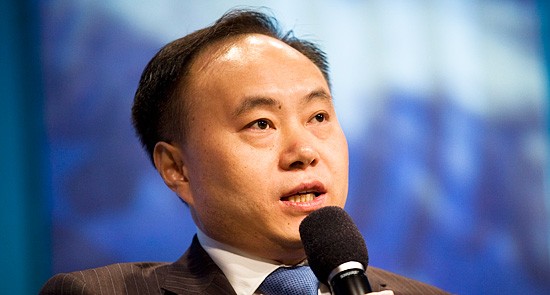
No wonder Crikey has been struggling to get hold of reclusive Chinese-Australian solar baron Shi Zhengrong.
Curious at the fallout from serious fraud problems at Suntech, the giant solar panel firm he set up, Crikey has been trying to ask Dr Shi about his future and whether he’s coming back to Australia at some stage. The most recent response from his PR flunkey was:
“I’m sorry, but I don’t think we will be able to get a response from Dr Shi before the deadline. Would it be possible to extend the deadline? We are currently working on finalizing our Q4 financials …”
What they were working on, we now know, is that Shi has this week been removed as chairman of Suntech — although he appears to be reluctant to accept the decision. He issued a statement describing his dismissal as “unlawful” and “invalid and of no effect”:
“I will take all steps necessary to protect the company from being harmed by unlawful actions such as the above.”
It’s a stunning fall from grace for the man whose early entry into the solar industry made him at one point the richest person on mainland China (and the fourth richest Australian).
So who is Dr Shi Zhengrong — and what does this rags-to-riches-to-rags tale have to do with the University of NSW?
Shi spent more than a decade in Australia as a young man, and is an Australian citizen. He did his PhD at the UNSW’s School of Photovoltaic and Renewable Energy Engineering, under the tutelage of the school’s well-regarded founder Martin Green. Shi completed it in a record two-and-a-half years, finishing in 1992, and was employed as a researcher at the university, before working at Pacific Solar from 1995 to 2001.
He was lured back to China in 2001 by a forward-looking provincial government to set up a manufacturer of solar panels, Suntech, in Wuxi. The company thrived on producing panels using both standard panels and higher performance Pluto technology panels co-developed with UNSW; Suntech was floated on the New York Stock Exchange, and sold 25 million panels. At the company’s high point around 2006-07, Shi was the richest person in mainland China. Time named him a “hero of the environment”. The Australian flag was flown outside company headquarters. As recently as 2011 Shi had a home in Sydney and returned each year for Christmas.
But last year the company was hit by a fraud involving German loan guarantees which were used to secure finance for new projects. The dodgy loans were said to be worth 554 million euros; Suntech’s share price crashed. Forbes calculated Shi’s wealth plunged 90%. As Reuters reports, the company is not out of the woods yet.
Last year Shi was demoted from Suntech CEO to executive chairman, and this week he was further demoted from chairman to director.
So is this it for the career of the man dubbed the Sun King? And is there any truth to the rumours Shi is contemplating a return to Australia?
Shi’s technological nous is not in question, but his business sense is.
Green, in an interview with Crikey before Shi’s latest demotion, said he thought Suntech would survive the scandal. He said the incident with the false bonds came at a bad time for Suntech because the solar market is tight and cash is scarce (the industry has been through a global shakedown and prices are falling).
Green said Shi deserved credit for developing the thin-film silicon formula that other manufacturers used. He pioneered lower-cost Chinese manufacturing in a difficult regulatory environment, and his savvy use of US capital to grow his firm paid off. “He’s very good at anything he puts his hand to,” he said, adding Shi was “very easygoing and quite relaxed”.
*Read more about Shi’s Australian alma mater, and Green’s influence on Shi and other solar high-fliers, in the Power Index profile on Green. Crikey is counting down the 10 most powerful people driving Australia’s low-carbon economy, resuming at number seven next week.








The technology used at Suntech is actually standard crystalline silicon not thin-film silicon as stated. The thin-film technology was developed by Pacific Solar and then by CSG Solar.
Thanks Bonne, you’re right. I chased up your comment. Shi did work with UNSW on thin-film panels, but didn’t take that technology to Suntech. Suntech has produced both standard panels and higher performance Pluto technology panels co-developed with UNSW. I’ve changed the copy.